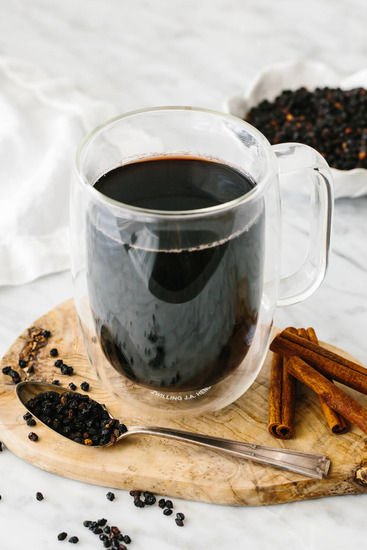Why is elderberry amazing for our gut?
Originating from Europe, elderberries have been used for medicinal purposes with cold and flu symptoms. Elderberry is a fruit used in traditional forms of medicine for Native peoples in the United States, France, parts of Asia, and northern Africa due to its high versatility. This fruit is included in the category of #GoodGut foods with an elevated level of caution and warning: raw and uncooked elderberries are poisonous and contain cyanide-inducing glycoside. Elderberries must be cooked in order to break down this toxin and extract any of the health benefits. All other parts of the elderberry plant are toxic as well, so avoid consumption and contact with these plants.
While there are no standard doses for elderberries, 100 grams (½ cup) of elderberries would deliver sufficient nutrients for fiber, vitamins, and antioxidants, without additional risks. Elderberries contain high levels of antioxidants, probiotics, vitamin C, folic acid, and dietary fiber providing 10.2 grams per cup. Folic acid acts as a nutrient source for gut microbiota which may help to suppress the colonization of pathogenic bacteria. Daily consumption is not recommended as research on long-term use (>1 week) of elderberry has not been fully investigated, nor has use in pregnant or breast-feeding women.
Consumption of elderberries may help to stimulate the secretion of digestive enzymes in the gut, promoting healthy digestion. They may also provide anti-inflammatory properties from the high variety of polyphenols and vitamins that protect against oxidative stress. Once more, the elderberries should be fully ripe and cooked before consumption, and leaves and stems should not be consumed in any state. In taste, they are described as very aromatic and sweet, but slightly bitter; the closest match to the flavor is that of a blueberry. Elderberries are ripe and ready for harvest when they are black, never when red or green.
Ways to eat it
Since there is an elevated risk with preparing these fruits, we recommend buying pre-cooked and prepared food items with elderberries. Try consuming cooked elderberries as juice, jam, chutney, and even as a tea!
Many commercial elderberry products exist which can be found at most grocery stores.
Recipe: Elderberry Tea

Picture from downshiftology.com
Ingredients (Makes 4 Servings):
1/2 cup elderberries
2 cups water, boiled
4 Tbsp date paste (recipe on page 75)
Directions:
Remove the stalks.
Cook the berries in water.
Add date paste or stevia (optional).
Strain.
Pour into a cup and enjoy!

Heal With Each Meal!
Want These #GoodGut Recipes and 100+ More? Click Here
Sign Up for Our Newsletter Click Here
Become a Patient Click Here
References
Charlebois, D. (2007). Elderberry as a Medicinal Plant. ASHS Press, 9.
Cross, T.-W. L., Zidon, T. M., Welly, R. J., Park, Y.-M., Britton, S. L., Koch, L. G., Rottinghaus, G.
E., de Godoy, M. R. C., Padilla, J., Swanson, K. S., & Vieira-Potter, V. J. (2017). Soy
Improves Cardiometabolic Health and Cecal Microbiota in Female Low-Fit Rats.
Scientific Reports, 7(1), 9261. https://doi.org/10.1038/s41598-017-08965-0
Elderberry: Health Benefits, Risks, Uses, Effectiveness. (n.d.). WebMD. Retrieved April 16,
Flavonoid-rich elderberry provides immune support via a microbial reaction in the gut
Kashi, D. S., Shabir, A., Da Boit, M., Bailey, S. J., & Higgins, M. F. (2019). The Efficacy of
Administering Fruit-Derived Polyphenols to Improve Health Biomarkers, Exercise Performance and Related Physiological Responses. Nutrients, 11(10). https://doi.org/10.3390/nu11102389
Kumar Singh, A., Cabral, C., Kumar, R., Ganguly, R., Kumar Rana, H., Gupta, A., Rosaria
Lauro, M., Carbone, C., Reis, F., & Pandey, A. K. (2019). Beneficial Effects of Dietary
Polyphenols on Gut Microbiota and Strategies to Improve Delivery Efficiency. Nutrients,
Luttjohann, B. (2017, November 7). Exceptional Elderberries. The Permaculture Research
Sova, M., & Saso, L. (2020). Natural Sources, Pharmacokinetics, Biological Activities

Comentarios